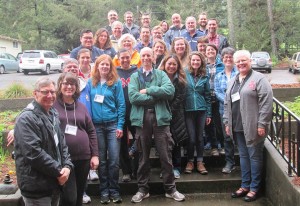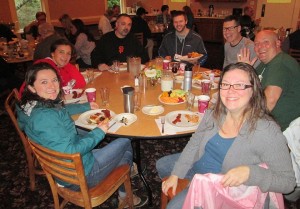Participants of the Brother John Johnston Institute of Contemporary Lasallian Practice ended the program’s inaugural run with three local sessions. After meeting for the past two years in local groups, online, and as a Regional group, these final sessions gave participants the opportunity to reflect on what they had experienced and to present their capstone projects.
[fusion_builder_container hundred_percent=”yes” overflow=”visible”][fusion_builder_row][fusion_builder_column type=”1_1″ background_position=”left top” background_color=”” border_size=”” border_color=”” border_style=”solid” spacing=”yes” background_image=”” background_repeat=”no-repeat” padding=”” margin_top=”0px” margin_bottom=”0px” class=”” id=”” animation_type=”” animation_speed=”0.3″ animation_direction=”left” hide_on_mobile=”no” center_content=”no” min_height=”none”]

Johnston Institute gathering in the District of San Francisco New Orleans, March 2016. Courtesy Richard Pichon
Beverley Madar, a theology teacher at Bishop Loughlin Memorial High School in Brooklyn, New York, who attended the east coast gathering March 17-20 in Eatontown, New Jersey, reflected on the Lasallian mission after her Johnston experience, calling the mission a catalyst for change.
“It can be expressed in many ways: through participation, community, education, care of the poor and impoverished, and so much more,” she said. “But the journey begins with the individual – anyone who seeks to change and to be the change – and wants to make a difference for the good.”
Greg Kopra, director of formation for mission for the District of San Francisco New Orleans and one of the District facilitators of the Johnston Institute, attended the gathering for west coast participants March 3-6 in Russian River, California. He said after listening to participants’ reflections, he felt the Johnston Institute had fulfilled its purpose.
[/fusion_builder_column][fusion_builder_column type=”1_1″ background_position=”left top” background_color=”” border_size=”” border_color=”” border_style=”solid” spacing=”yes” background_image=”” background_repeat=”no-repeat” padding=”” margin_top=”0px” margin_bottom=”0px” class=”” id=”” animation_type=”” animation_speed=”0.3″ animation_direction=”left” hide_on_mobile=”no” center_content=”no” min_height=”none”]

Johnston Institute gathering in the District of San Francisco New Orleans, March 2016. Courtesy Richard Pichon
“Participants have connected more personally to De La Salle’s story, they have learned much about significant elements of Lasallian mission, and they are inspired to put their learning to work,” Kopra reflected. “They have been strengthened in their vocation as Lasallians, and are at the same time acutely aware that there is so much more to learn, to do, to experience. As with the Founder, one commitment continues to lead to another.”
Throughout the two years of sessions, the Johnston Institute focused on the Lasallian heritage in light of contemporary realities. The program covered three thematic areas: the Lasallian story and vision, Lasallian educational service to the poor and the promotion of justice, and Lasallian spirituality, vocation and association.
The program was a powerful experience for Pamela Thompson, director of marketing for Anselm Academic, the college imprint of Saint Mary’s Press, who attended the Midwest gathering March 10-13 at Our Lady of the Snows in Belleville, Illinois.
“The capstone session of Johnston offered the opportunity for all members of our cohort to wrap ourselves in the Lasallian fabric that we have woven together over the past several years,” she explained. “Like a patchwork quilt, pieces of our hearts and experiences – both brought and given – were stitched together with the teachings of Saint La Salle and will forever warm us and be handed on to others, carrying on his legacy.”
Looking to the future of this formation program, the Region and Districts will review the first cohort experience, using the opportunity to evaluate both the goals for the program, how well those goals were met, and how to best move the program forward for the next cohort, which will begin in the summer of 2017.
See more pictures >
Learn more about the Johnston Institute >[/fusion_builder_column][/fusion_builder_row][/fusion_builder_container]